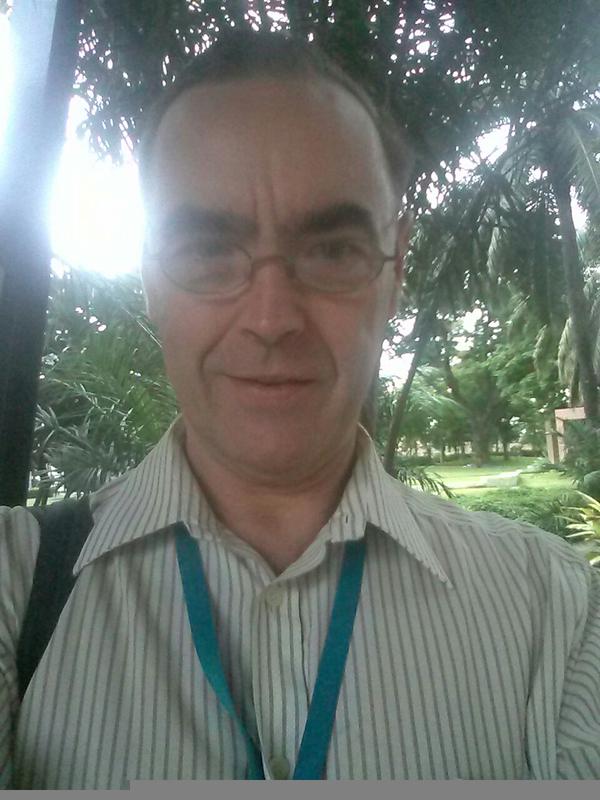
Over the past five days, Wyn Ellis has been woken several times each night by guards bursting into his cell at Bangkok’s Suvarnabhumi International Airport. Through the fog of sleep he’s watched as one of his 30 or so bunkmates is roused from narrow cots and hustled out the door toward deportation and a waiting airplane. “I’m going to have nightmares in the future about this,” the 57-year-old tells TIME by phone from detention.
Ellis is an unlikely figure to wind up in immigration purgatory. A Welsh academic who consults on sustainable rice production for the U.N. Environmental Program, he was detained on Thursday after airport officials found his name on an immigration blacklist. He now finds himself in the middle of what he deems a “Kafkaesque bureaucratic nightmare.”
It all stems from a 2008 legal dispute with Thai academic Supachai Lorlowhakarn, who Ellis proved in court had plagiarized his work, among others. Before being sacked in disgrace, Supachai, then director of Thailand’s National Innovation Agency (NIA), managed to get Ellis added to a list of foreign undesirables barred from entry to the country.
However, as Ellis had a Thai passport owing to his Thai citizenship — he has lived in Thailand for three decades and is married to a former Thai civil servant — this listing went under the radar of immigration officials. That was until Ellis returned from vacation in Norway last week.
He had misplaced his Thai passport and so was forced to present his British one, which drew the attention of immigration officials to the list. They detained him and, after he refused to purchase a plane ticket back to Oslo, marched Ellis to the crowded, windowless holding cell where he remains.
“There’s stench of urine and the toilets are unbearable — overflowing and flooded,” he says. “And then there are the cockroaches.”
On Friday, Ellis managed to get hold of a letter from the current NIA chief that requests his removal from the blacklist. “That means the Immigration Department now has no grounds to detain me and it should be a procedural thing to lift the ban,” he says.
But, three days later, no progress has been made. This is even more galling as the letter should be a moot point — Ellis’ status as a Thai citizen makes it impossible to be banned entry to his adopted homeland. (His citizenship would have to be revoked first.) Yet so far officials appear unwilling or unable to reconcile Wyn Ellis the Thai citizen with Wyn Ellis the British passport holder.
Ellis attributes this to “a heightened sense of security” following last month’s bombing of Bangkok’s Erawan Shrine. Twenty people died and more than 120 were injured in the blast, which junta chief Prayuth Chan-ocha deemed the worst attack on the Thai capital in recent memory.
It means “no one is willing to put a foot wrong and no one is willing to shortcut anything,” says Ellis. “People don’t want to stick their necks out for anyone. It’s a fairly draconian regime now,” he says of the junta that has ruled the country following the coup of May 22, 2014.
The U.K. ambassador to Thailand has made contact and is trying help, though Ellis isn’t holding out too much hope. “With Thai bureaucracy you just can’t second-guess it,” he shrugs.
That said, simply receiving such offers sets Ellis apart from his typical cellmate, most of whom hail from South Asia and the Middle East and have few avenues to expedite their release. Thailand has not signed the 1951 Refugee Convention nor has functioning asylum procedures. “There’s a Palestinian guy who’s been in here for nearly 10 months,” says Ellis, “he hasn’t seen the sun in all that time.”
More Must-Reads from TIME
- Where Trump 2.0 Will Differ From 1.0
- How Elon Musk Became a Kingmaker
- The Power—And Limits—of Peer Support
- The 100 Must-Read Books of 2024
- Column: If Optimism Feels Ridiculous Now, Try Hope
- The Future of Climate Action Is Trade Policy
- FX’s Say Nothing Is the Must-Watch Political Thriller of 2024
- Merle Bombardieri Is Helping People Make the Baby Decision
Write to Charlie Campbell at charlie.campbell@time.com